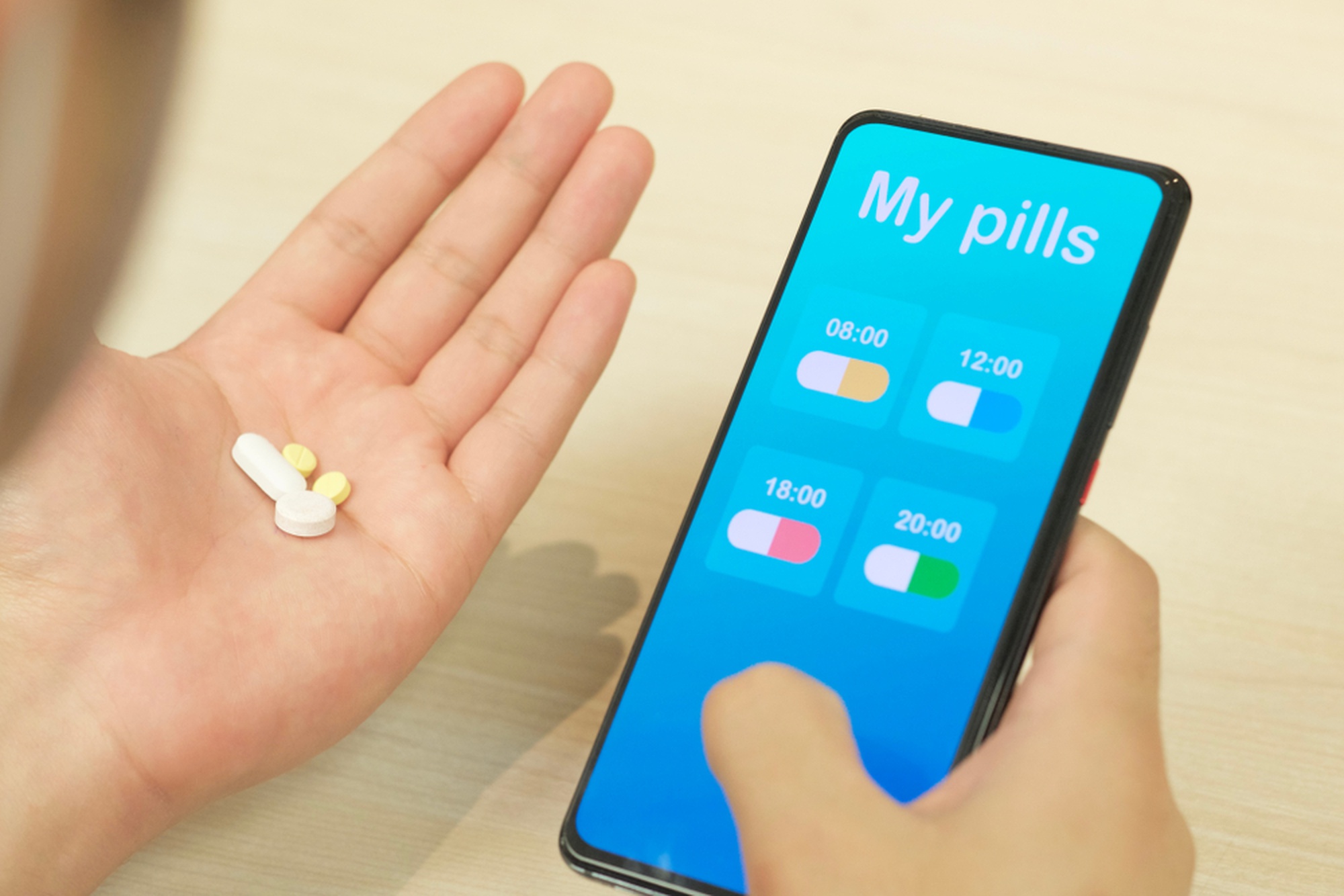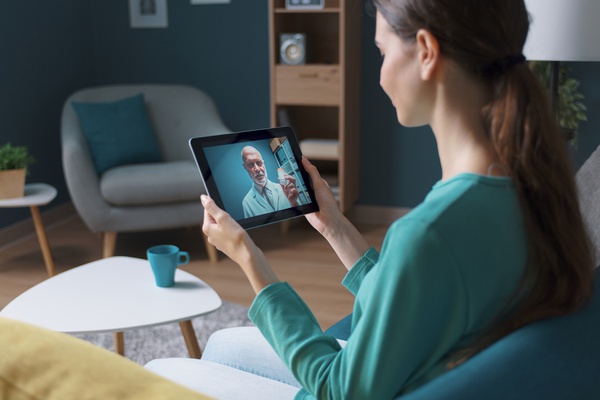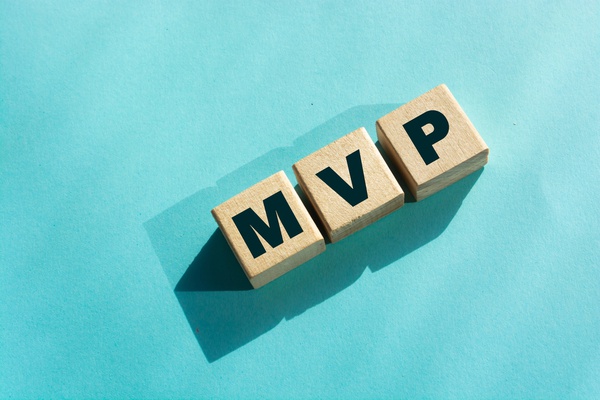According to research, medication non-adherence causes 125,000 preventable deaths a year and around $100 billion preventable medical costs. Forgetting to take medications is a severe problem for patients with chronic conditions, including diabetes and hypertension. With that said, non-adherence affects up to 60% of these patients.
Another study shows that around 90% of patients receiving long-term care take five or more medications daily. Most of these patients are older adults who are particularly vulnerable to improper medication intake.
Considering this data, it’s no surprise that the demand for effective drug tracking solutions is growing. After all, 75% of mobile health (mHealth) app users consider in-built reminders helpful for medication management. And what’s more important, 30% of them would like to use a standalone application with more advanced features.
If you’re interested in developing a medication tracking software, this article will provide you with great insights. You’ll learn about the market, its trends and leaders, and medication tracking software development essentials.
Medication management software trends after COVID-19
The global pandemic has shaken the world to its core, and the changes are particularly noticeable in healthcare. The physical barrier to interaction between patients and physicians has accelerated the digital transformation of the industry. Pharmaceutical companies need to be creative and flexible to adjust to new restraints, including home working, travel bans, stalled clinical-trial process, and diverted budgets.
Read also: How to Build a Pharmaceutical Software
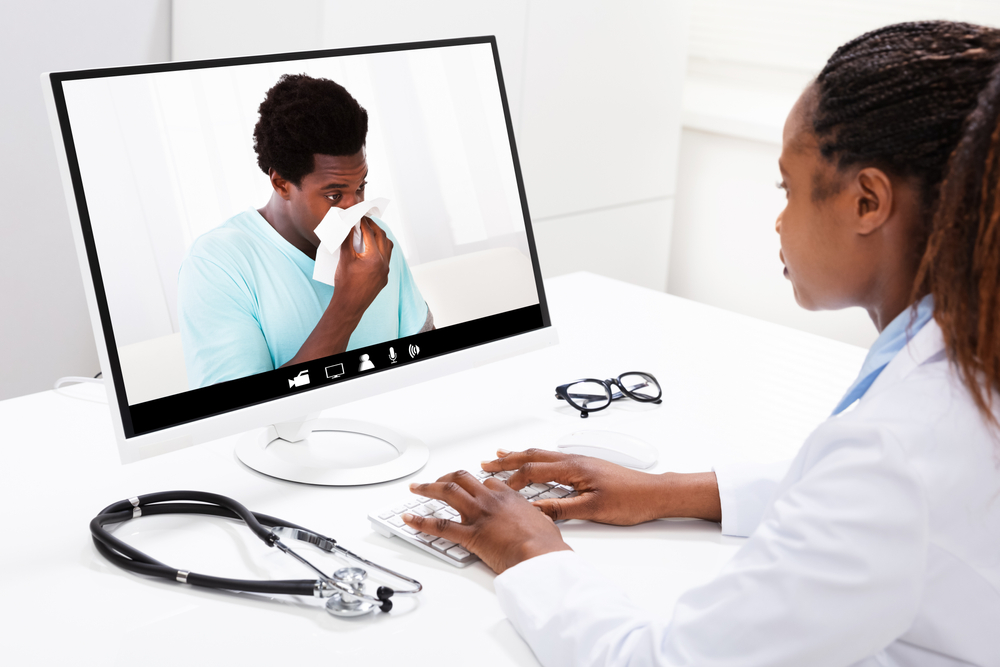
With the growing popularity of telehealth integration and health tracking apps, the tendency for receiving care at home rather than at the hospital will most likely continue. It will also boost medication management app development, aiming to improve medication adherence and remind patients about prescription refills. Major healthcare trends — patient data analytics, machine learning, big data — contribute to the growing use of multi-featured software for medication management instead of a simple prescription tracker app.
The pandemic has also affected the overall attitude. It has encouraged patients to use more digital technologies for managing their health and be more engaged in therapy. According to a Deloitte survey, 42% of US consumers used tools to track their health goals; about half of them shared data with their doctors. Of those who tracked their health, 77% said the app changed their lifestyle at least moderately. The patients’ willingness to share their data has also increased, which is crucial for developing interoperable data platforms.
How medication tracking software works
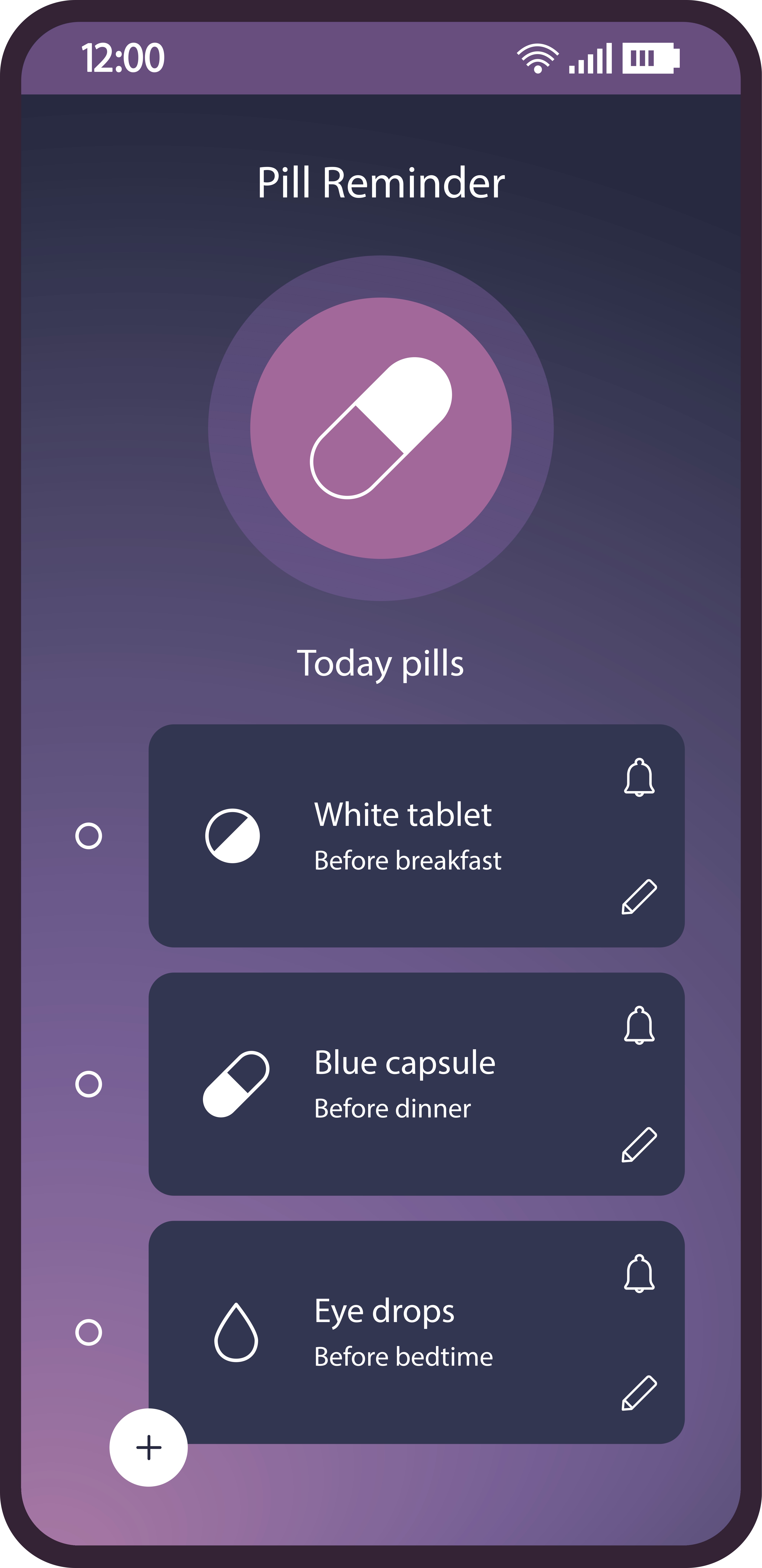
Medication alert software is designed to help patients improve medication adherence. The core function of the app is to schedule medication intake. In some cases, for security purposes, the medication plan should first be set by a physician and then shared with the patient’s device.
The modern offerings of medication reminder application development include three types:
-
Simple medication reminders (SMRs) prompt users to make schedules and create notifications.
-
Advanced medication reminders (AMRs) have additional features like medication photos, late or missed dose tracking, user notes, and time zone support.
-
Medical management apps (MMAs) combine both SMRs and AMRs features and allow users to store and manage their electronic health data. They can also share it with the doctor. MMAs can be vital for patients who use antibiotics for a long time or cancer patients getting chemotherapy.
Many modern MMAs have an in-built drug interaction checker. When a physician updates the medication plan, the checker runs a test to ensure the drugs are compatible. If they aren’t, it sends a notification. This is particularly helpful if the patient has any specific allergies recorded in their electronic health data.
MMAs can also be integrated with an e-prescribing system. Together, they have the potential to eliminate most errors associated with drug use. E-prescribing sets a connection between patients, insurers, physicians, and pharmacies, enhancing the process through clinical decision support systems, databases of patient electronic health records (EHR), and clinical research papers.
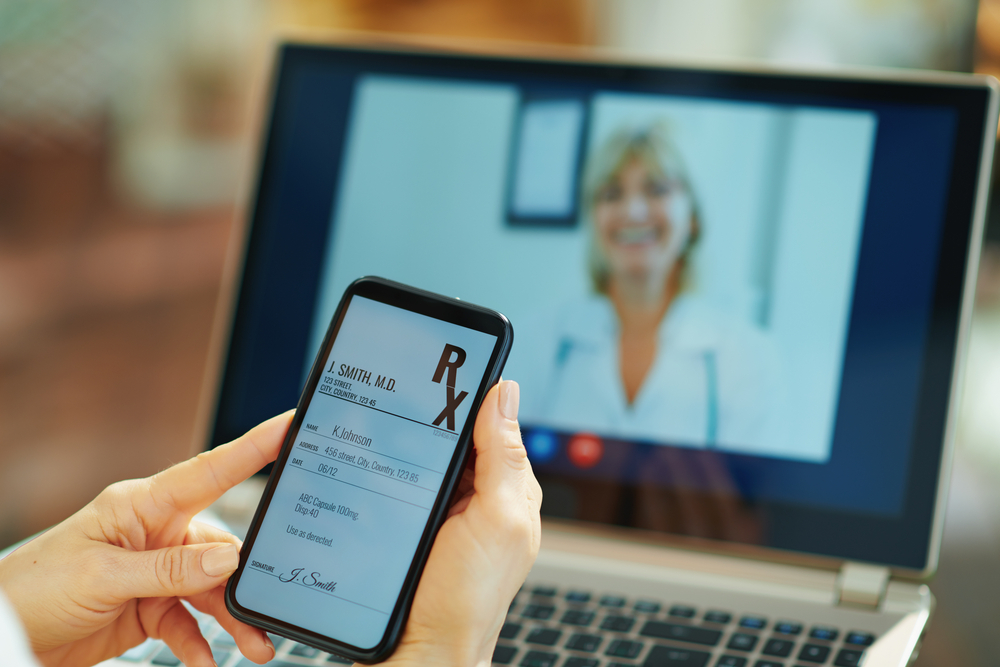
Must-have features for medication tracking software
When developing a patient medication tracking software, it’s essential to stay competitive on the market, providing users with a set of features that is a must-have for this type of software. Despite the diversity of MMAs, some functions remain common for all of them.
Digital scheduling
Scheduling allows users to create medication plans by entering basic information, including medicine names, their physical descriptions, doses, administration method, and time. In some cases, the medication plan should be created by the physician to ensure the safety of the patient.
Smart reminders
Popups alert users when it’s time to take the prescribed medication or replenish the stock. Advanced reminders also work for people with vision or hearing impairments.
Tracker for health parameters
It’s important to monitor health parameters when taking certain pills. This information is valuable for a doctor to check the progress, detect side effects before they can seriously affect a patient, and adjust the medication plan if needed.
Interaction checker
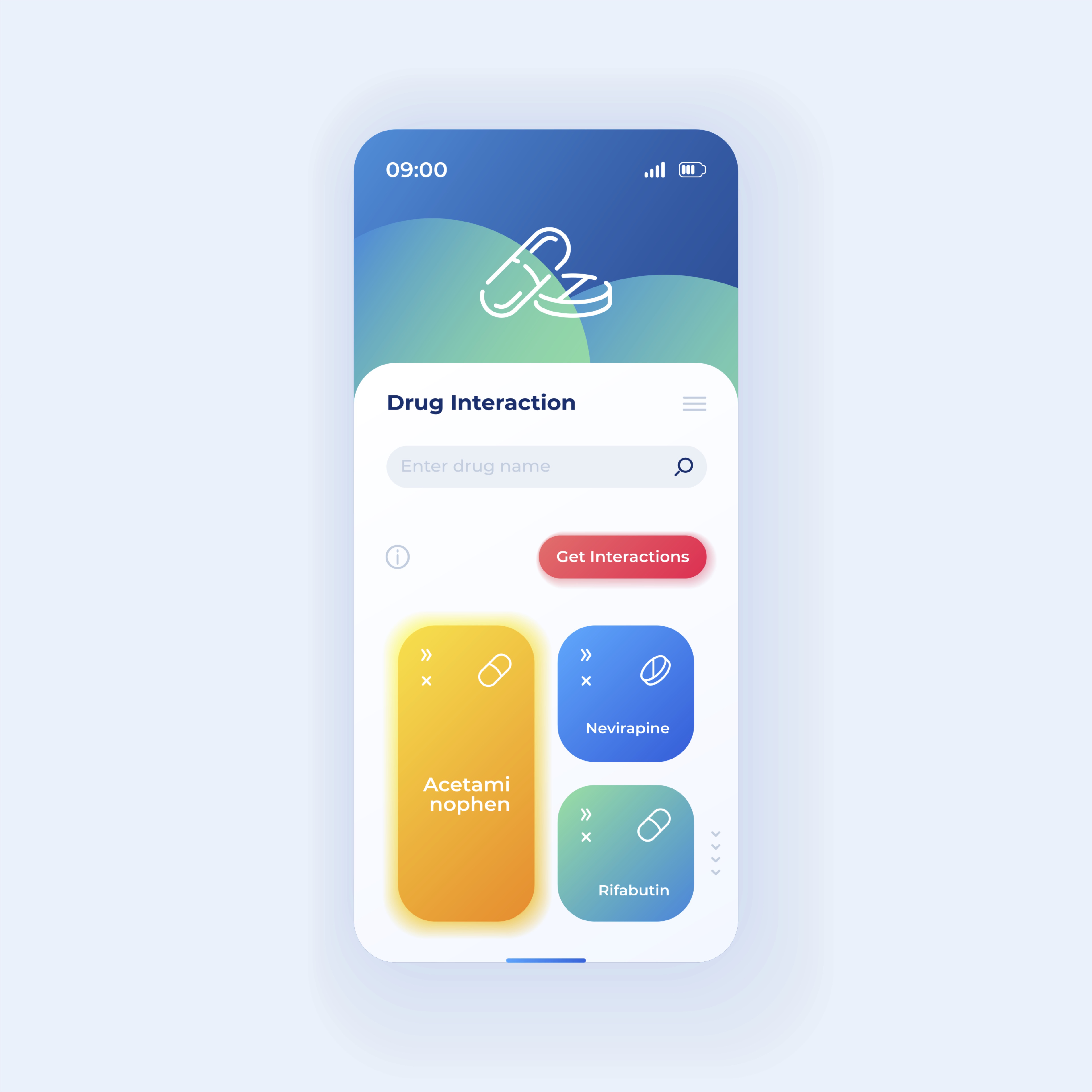
The checker has an interaction algorithm warning users if a new type of medication is not compatible with the previous one. Advanced reminders allow users to input data about their allergies or other conditions that can affect drug intake. In some apps, it’s possible to connect to the patient’s medical data.
Prescription renewal
The app notifies the user when it’s time to refill the prescription. Although many apps only send alerts, some offer users to fill a form and send it directly to a doctor.
Data sharing
This option allows users to interact with the physicians and share medical records, provided all data manipulations comply with the official regulations. Some apps also allow to export or share medication plans and other stored information with caregivers.
Synchronization across multiple devices
Synchronization allows users to check and receive reminders from the app on several connected devices at once.
The ability to check the nearest pharmacies on the map, live chat with a doctor, video chat in case of emergency, e-payments through the app in your smartphone are other features that can make your medication tracking app stand out from competitors.
5 prescription tracker apps to analyze before developing yours
Before starting medication tracking app development, you need to know the market leaders and understand their pros and cons. Although there are many available pill reminder apps, only a few are highly rated, designed for both Android and iOS devices, and can offer their users additional functionality.
Medisafe
Medisafe is a market leader with almost 5 million users in over 150 countries. This company is a user-friendly mobile app that sends users personalized reminders to take their medications and warns if medications are not compatible with certain drugs, food, or beverages. The app has refill reminders to ensure that the user will not run out of their medications.
Medisafe collaborates with pharmaceutical companies, drug retailers, care providers, and insurers. This collaboration aims to create an environment for enhancing patient engagement and improving medication adherence. It is also easily integrated with Healthkit (iPhone) and Android-wear to track patient health parameters.
Medisafe is HIPAA compliant and uses encryption to ensure user privacy, but the developers do provide anonymized, aggregated user data to healthcare companies. Although anonymized data can help develop better research and treatment systems, some users are against the fact that their data is shared.
CareZone
While Medisafe is the overall leader, CareZone is considered the best app for health management. It reminds users to take their medication in time, keeps track of doctor appointments, records health parameters, and helps to order refills.
Within the app, users can set medication reminders in groups or individually, which is particularly helpful for patients with complicated medication plans. Adding new medication is simplified by a scan feature: all the required information is added to the app automatically from a scan of the drug label. Keeping track of the remaining medications has also been simplified through the CareZone pharmacy. Users not only receive alerts but can get meds delivered to them for free.
A personal care advisor algorithm, an achievement feature that motivates users to set and achieve health goals, and patients communities that encourage users to share their experience are other examples of the app’s functions.
Despite many pros of the app, it is now available only in English, making it accessible only for English-speaking customers.
Mango Health
Mango Health is the best option for the users who require a diary option and the ability to share medical data. The app aims to simplify the medication management process and add some fun to it. Along with highly customized scheduling and alerting functions, the app also includes healthy habit reminders, a gamified point system, and prizes for taking medications according to the schedule. The daily health diary feature allows users to track the progress by taking notes about their symptoms and share this information with their doctor.
There are still significant drawbacks to consider. Unlike other competitors with the scan or import features, Mango Health users need to enter their medications manually. Another con is that the app’s healthy habit reminders are limited to several pre-programmed habits, and users cannot add new ones. And according to user feedback, the app does not function well when the user changes their time zone.
Dosecast
Dosecast is a highly customized app offering users a variety of options and themes for their notifications. Though it was launched back in 2010, it is still the easiest app to use. The app offers standard features like scheduling and alerting, has an in-built drug interaction algorithm, refills alerts, and keeps track of user medication adherence. Besides, Dosecast allows users to connect to their doctors or pharmacy when they have questions or need a refill.
A major advantage of the app is its high compatibility with smart devices, including those of Apple, Android, and Amazon. Dosecast does not collect any personal information, and users can be more confident that their privacy is secured. Unlike many other apps, Dosecast doesn’t have any functioning problems when the user changes the time zone, making it a perfect option for travelers.
The biggest drawback of the medication adherence app is that some features, like refill reminders and pill count, which are commonly free on competitors' apps, are only available for Pro users.
GrooveHealth
GrooveHealth is an innovator in medication reminder app development, taking healthcare and technology integration to a new level. Its most unique feature is an AI-powered chat-bot Maxwell. It can assist and motivate users, as well as provide them with personalized health tips.
The app has all must-have features like scheduling, reminders, refill alerts, drug interaction checker. It also allows users to share their data with family members to keep them informed about the treatment progress and updates.
GrooveHealth doesn’t support import or scan features for adding medications, and users need to do it manually. Another drawback is that the app is currently available only for English-speaking users.
Medication management app development from the scratch

If you decide to build a medication management app, you need a detailed project plan covering four main stages.
Project definition
At this stage, it is crucial to define the scope of your future medication tracking app, research user needs, prioritize the app’s features, decide on the Android and iOS availability.
Project planning
When developing an app, be ready to comply with HIPAA standards and regulations related to health data management and storage. The main focus here is information security. It requires multi-factor authentication, encryption algorithms, and techniques to secure APIs. At this stage, you will need to choose the cloud platform, decide on third-party integrations and the technology stack.
Medication tracking app development requires a team of specialists, including developers, UI/UX designers, testers, and DevOps engineers. The overall result will depend on the expertise of the team you hire.
Design and development
Thorough project planning implies creating milestones at every level for ensuring a streamlined process. After they were set, a UI/UX designer creates wireframes and prototypes for app visualization. A good design will help users interact with your app intuitively, discovering features without the unnecessary stress and extra effort.
The wireframes and prototypes then go to the engineering team. Make sure the developers you choose are competent and experienced.
At Demigos, we emphasize flexibility, scalability, and security to ensure that the apps we develop can be easily optimized for changes, used by millions of daily active users, and provide a high level of data security. While scalability is crucial for any app, the top concerns when developing a healthcare app are adjusting to the fast-changing healthcare regulations, user data privacy and security.
Launching and maintaining
Before launching your medication tracking system, it should be thoroughly tested. Quality assurance guarantees the app doesn’t have any dysfunctions and bugs. Application maintenance also implies regular testing, updates, and bug fixes to ensure the best app performance and user experience.
Choosing the right medication tracking software development partner
According to Statista, the software developers population in the world will reach 28.7 million by 2024, which is higher by 4.8 million compared to 2019. Another research estimates that the world market for application software will grow by $37.74 billion between 2018 and 2022. The demand for software development is growing, but the more developers, the harder it is to choose a reliable partner that matches your needs.
When choosing a partner to build a hospital medication tracking system, healthtech experience and expertise are vital. Today, healthcare is a fast-changing industry due to the boosted digital transformation and constantly updated regulations. Every institution expects a unique set of features from the software. Integration of healthcare software with third-party solutions, such as EHR databases, HRM software, payers databases, ensuring a high level of data security have become a necessity.
At Demigos, we emphasize developing custom products compliant with regional and industry standards. Our systems easily capture and analyze large amounts of data while ensuring its high security and breach protection.
Conclusion
The growing demand for digital solutions and medication management apps will continue, especially after the pandemic set a new trend for home-based care delivery. Medication tracking and reminder are also powerful tools addressing a common problem of medication non-adherence.
Whether you want to develop a pill reminder app, a drug tracking system, or a complex app with multiple features, you will need a team of professionals to assist and guide you through the stages of the development process.
Want a custom-tailored app that is easily optimized, scaled, and has a high data security level? Let’s develop it together! Check our successful projects , telemedicine software development guide, or contact us to discuss the project you have in mind.

